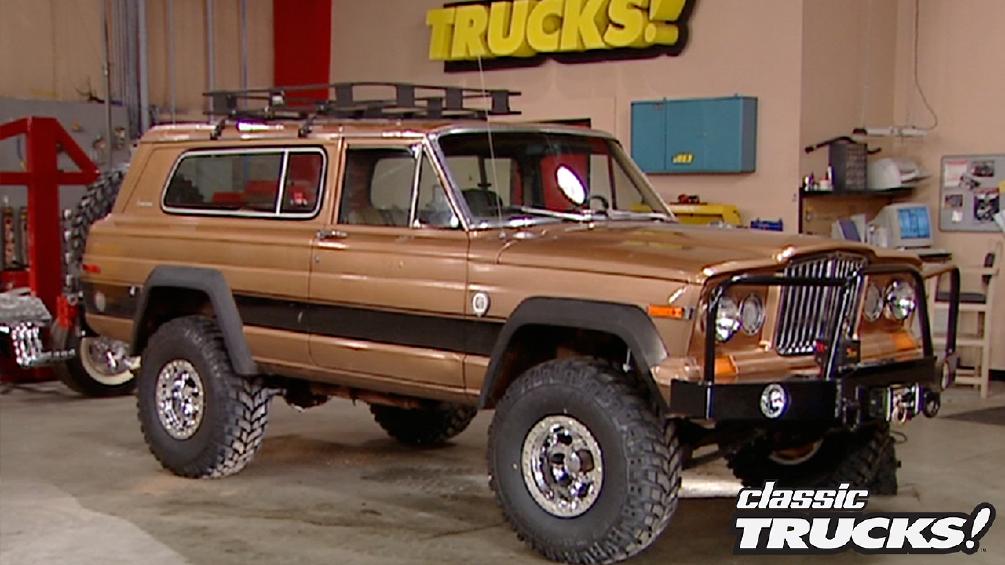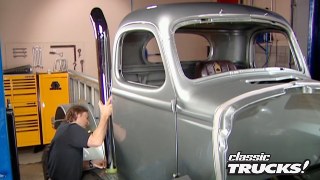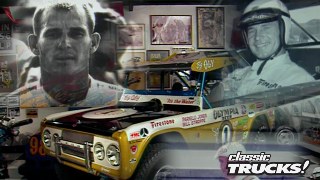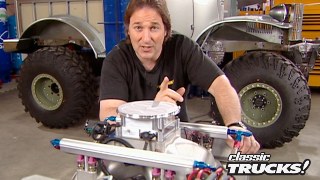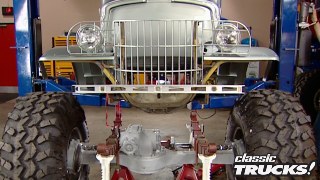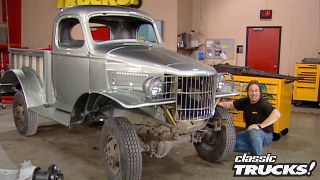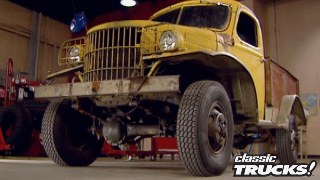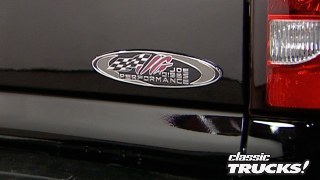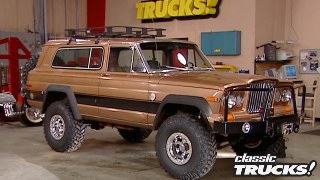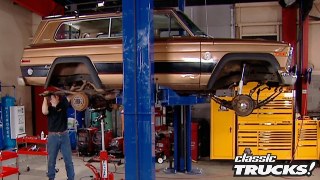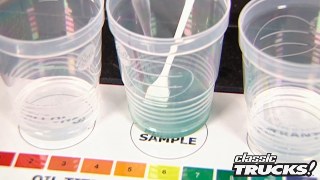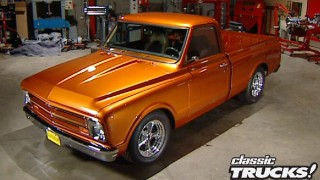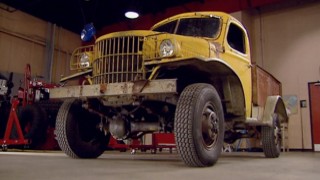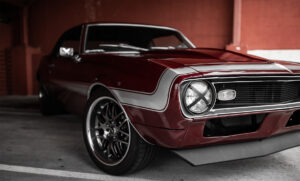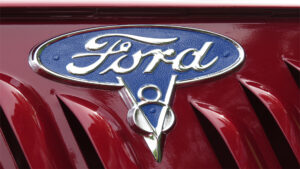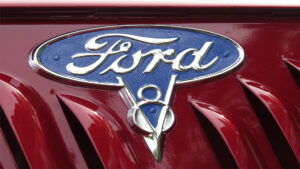Classic Trucks! Builds
Want more content like this?
Join the PowerNation Email NewsletterEpisode Transcript
Hey, welcome to trucks. If you were here last week, you saw me roll this old 79 Jeep Cherokee into the shop. The reason
to show you the potential that these old full size Jeeps have either as an entry level off rotor
or as a hard core off rotor. Remember most of these came from the factory with D
of 44 axles, front and rear
disc brakes in the front, power steering, power brakes, air conditioning V8
and these things were loaded and the good news is you can buy one used for cheap.
That's why I'm calling this
the Bargain Beater Cherokee.
Ok. There's no doubt that this is a great starting point,
but a full size Jeep would not be that good a deal if you couldn't modify it and make it better for a reasonable amount of money.
So the purpose of this project is to show you how to do that. Here's what we've done so far. First, the old tired sagging suspension was carefully removed.
Uh
And in its place when a six inch lift from DJ S off road,
then the old beat up wheels and tires were replaced with 35 inch rolling stock for Mickey Thompson.
Look at this, this thing is cool
then to make sure that our Cherokee looks different than all the others on the road. The seventies grill was tenderly set aside.
The beloved square headlights were carefully removed
and the front end retrofitted with the classic sixties Jeep Gladiator front end that we all wanted in the first place.
This is what we started out with
and this is what we've got now,
which would you rather have?
All right, now that we're all up to date and we put those square headlights to rest. We're gonna move on to the next step of making this old wagon a little more trail worthy. I'm talking about bumpers and winch.
The bumpers came from B J's off road and they are definitely designed for some severe use. Look at this here on the front. It consists of a heavy duty main bumper.
It's already cut for off road lights, got your D ring shackles built right?
And in as well as your area here for your winch.
Then up here on top,
you've got a very heavy duty brush guard
to keep rocks and sticks and logs and stuff from getting in and bashing up the front of your rig.
The rear bumper is just as cool as the front because once again, you have a heavy duty bumper, got the receiver built right in D ring hooks off road lights. You even have this swing arm
that holds a spare tire and accessories. Yeah, these are cool bumpers.
This is how they go in
first on the front. We're gonna ditch that all original bumper
then position the new bumper on the truck
and make sure that you take some time here because you want it to sit straight and level against the truck.
Hi, don't drop it on my head. Now,
does it look level up there?
Ok. Lift it up just a little bit. No side
and once it's right mark and drill the mounting holes in the bumper,
then all you have to do is bolt it on.
Well, follow that up by installing these five inch pro comp off road lights. Now, since the bumper is made specifically for these, it's just a matter of putting them in
and hooking them up.
All right. Now we can move on to one of the most important pieces that you're gonna put on a four wheel drive vehicle. A winch. No, it's not here yet. It's on the table.
Yeah,
that big old boy is from mile marker and it's their 12,000 pound
electric winch.
This will give us enough power to pull ourselves or anybody else out of a hole. Now, we also have the fair lead roller and the remote, everything you're gonna need to hook this up. Now, some of you might be thinking, oh, man, 12,000 pounds a little big, isn't
it? Uh, it's one of the biggest mistakes that people make with a full size rig.
They don't put enough winch on it. If you've got something that heavy,
you need a 12,000 pound winch. Now, to go with that,
we also got this winch accessory pack. So you have your gloves and your strap, your snatch block everything that you're gonna need to put that winch to work. Now, another option that we also got is this wireless remote.
Now, this allows you to control your winch from a distance just by pushing these buttons. It is sweet. All right, let's put this thing on.
Ok. To mount the wins, just center it up behind the fair lead opening,
drill, your mounting holes and bolt it on.
Follow that with your electrical connections
and you are ready to win something except for one thing. You know how I'm always telling you that the more electrical components you add, the more power that you're gonna need.
That
is what this optima battery is for to power that winch and lights.
Matter of fact, in keeping with the best bang for the buck idea. A performance battery is definitely something you need to put into your budget.
All right, it's time to take a break when we come back, we're gonna jump on that rear bumper.
Hey, welcome back to trucks
and our bargain Beater Cherokee project
where the whole idea here
is to show you how to get the best bang for your buck
out of a project vehicle that's gonna spend an equal amount of time on the highway
as it is on the trail.
Now, we've already put on a new front bumper. A winch upgraded the electrical system, six inches of lift and wheels and tires.
Now it is time to move on to the rear bumper.
You start the rear installation by bolting these braces that come with the kit to the lower frame rail,
then set the bumper in place and level it up.
Not as heavy as the front is it?
That's a good.
Ok. How does that work?
Well, it's level now though,
I pull
up.
How's your side?
Let me know if you hit your fingers at this moment.
Clamp the bumper to the braces
and tack on some spot whales to hold it in place.
Finally remove the bumper, lay down some we
beads
and it's ready to go back on.
Ok. The key to a good off road bumper that gives you the best bang for your buck is usability. Now, I'm not just talking strength here, although obviously you need that.
I'm talking about other ways that you can use the bumper. Let me show you what I mean.
You have a swing arm that allows you to carry important accessories like
an auxiliary fuel or water can, whichever you think is more important.
A high lift jack which is mandatory if you have a lifted rig
and of course a full size spare.
However, the really cool part is all this stuff easily swings out of the way so you can still get in the tailgate.
All right, there it is. Now, what you have is a cool combination, street and trail driver.
And all the modifications I did are money well spent because they make the truck better for a reasonable cost. And most of them are fairly simple.
Now, obviously, you can go a lot further than this for a trail rig. You can throw lockers in it or
build the motor stronger or put in a roll cage. The list is endless. And if you want to do more of a street rig, check this out.
B J's off Road has got a full line of interior and trim parts. If you wanna restore one of these old wagons, take a look at this, check it out. You got full carpet sets, front and rear,
you've got full upholstery kits, front
and rear.
You have custom gauge panels, weather stripping lights, guys. If you wanna restore a full size Jeep
B J's off road can help you out. Now, we're gonna take a break. Wait, wait, don't go too far because when we come back,
we're gonna take this thing out on the trail, take it on the highway, see how it does. Then we are gonna break down the actual cost of a project like this
and you're gonna find that you can not only do this project
but you can afford it. We'll see you in a minute.
Welcome back to trucks and the Bargain Beater Cherokee project.
Well, the whole point is to show you how to get the best bang for your buck in a four by four project.
And you've seen the build up now it's time to break it down. Show you what it cost and why we did it.
One well worn, fairly ragged. 79 Jeep Cherokee, 1500 bucks.
The good thing about this is you can just drive it. You don't have to worry about scratches or dents because you already have them and they actually add character
and off road. You can beat the living. We out of this thing and not really care.
Six inches of suspension left 700 bucks
getting this thing up in the air did more than just make it look better rolling down the road.
It gave us much more ground clearance for ruts and obstacles
flex for greater axle articulation
and the ability to handle much deeper water and mud.
35 inch tall tires on 15 by 10 inch rims. 1500 bucks.
The bigger tires go hand in hand with the lift to give us better traction.
More flotation in the wet and the mud
and better stability and handling in the rough,
heavy duty off-road bumpers. 700 bucks,
trust me, I would have never made it through this hole without that front bumper
mile marker. 12,000 pound electric winch. 750 bucks.
Let's face it. If you're gonna play around in water or mud without lockers, sooner or later the winch is going to become your best friend.
You see the trick is
to bury the vehicle just deep enough to where the water doesn't come inside.
Yeah.
Fortunately
this 12,000 pounder easily pulled the big Cherokee out despite being buried to the frame in the sandy creek bottom,
an early sixties style front end,
200 bucks
on rotor off. This thing is just flat out cool.
So there it is a great example of a cool capable rig
that you can build and afford the final cost of this project
just under $5400. Of course, I mean, you can keep working on it and make it even better
or you can just leave it like it is. Either way
you're building something yourself that you can really use. It looks cool and you're not breaking the bank doing it
that my friends is priceless.
When we're talking about big rigs, everybody knows that these things are heavy,
like 80,000 pounds worth of heavy, fully loaded.
So obviously, it takes some serious breaks to get one stopped.
Now, we've talked in the past a lot about the brakes down here on the axles, but
believe it or not, sometimes you need more breaks than this to get these things stopped,
but don't look for it down here on the axle. Now it's up in the engine. It's called the Jake brake. This is how it works.
How it works is brought to you by Wyotech.
All right, Danny. Today's subject is auxiliary braking. Specifically the Jake brake. So we need to talk to viewers through what it is and how it works.
All right, it really is a pretty simple operation. It's just using the compression of the engine to slow the truck down. Now, that's different than an exhaust brake. Exhaust brake uses exhaust back pressure to slow the engine down. This uses compression, only the compression. We're not using anything else and it's got a relief valve.
It does. And when that happens, we get to hear all that noise coming out through the exhaust.
Everybody's heard that everybody's heard that.
Now does this damage the engine at all? Not at all. I mean, we're going through the same cycles. Uh the four stroke cycle. Um We're only using the compression to break instead of power in the truck down the road.
How long has this been in operation for a lot of years? Really as we use it?
And
we
got a cummins head here,
the Jake brake assembly.
Let's take him to get that unit set on there. Let's take him through the operation of it.
It actually uses hydraulic pressure to open up these two exhaust valves over this, this uh bridge right here, use this slave piston. All right. And when that happens. Of course, the same thing when those open up,
when we start hearing that compression coming out through there.
Now,
when does the driver use this? The most important time is coming down off of his steep hill? Ok. So this doesn't replace the brakes down on the axles.
It does not, this is really,
really use this in town. You do not, I mean, you can, you, you've seen those little signs that no, don't use those in town. You know, you get those things shut off.
Now, how does the driver actuate this thing? The first step is to turn the switch on once he's got that on, he has to let off of the throttle for this to actuate and to come on.
So
off the throttle
brake comes on.
How about when he gets back on the throttle? She shuts back off again
and that's really quick. It really is. It, it'll come on and off very, very quickly. Ok. Now, the big question is,
you know, how popular all the small diesels are Ford power stroke,
Chevy
Duramax.
Is there a possibility? Something like this might become available? It might someday
be
sure it would. I mean, we're using the same cycle and the same thing and
yeah, it's not out there right now, but maybe someday.
Now the big question is, is this mandatory on big rigs? It is not, there's a lot of them or some of them out there that don't have it. So there's, there's trucks out there that don't have this
coming up in your rear view mirror.
Ok.
So the next time you're driving down the road and you see a big truck coming up on you and you hear that,
you've just heard a jake break and you better be thankful that you know how it works.
This is cool.
You know, one thing that you're gonna find in almost every shop or garage across the nation is some sort of an air system. On one end, you have the compressor,
the other end, you have a rubber hose. But in between those two,
you want some sort of tubing to carry that air.
That is where this garage pack stuff comes in.
Now, they've got this aluminum tubing
that'll handle up to 230 P si
then they have these special fittings that the tubing just slips into
and you have an airtight connection. No gluing,
no soldering. The best part is though
it comes right back apart so you can use it over and over and over again.
So if you are tired of dragging that rubber hose from one corner of the shop to the next, take some time and a few bucks
and plumb the system with this garage pack stuff, it will make a huge difference in the look of your shop.
I've told you before that one of the most important parts to any project is keeping accurate records.
That way. You know what you've done, what you've put on, you know, two or three years from now.
Unfortunately, most of us gearheads. Yeah. You know, we'll write down some stuff on a pad and
toss the pad aside and eventually lose it and forget what we've done.
Well,
pure choice Motorsports has got an answer to that problem in what they call the specialty vehicle owners manual.
Now, this ingenious little booklet has got places to write down everything about your vehicle, from wiring to engine parts to serial numbers,
interior body parts, guys. It is all here in one nice, neat, well organized little package. This is one of those simple, cheap little things that everybody should have and pure choice motor sports
is the only place to get it.
Show Full Transcript
to show you the potential that these old full size Jeeps have either as an entry level off rotor
or as a hard core off rotor. Remember most of these came from the factory with D
of 44 axles, front and rear
disc brakes in the front, power steering, power brakes, air conditioning V8
and these things were loaded and the good news is you can buy one used for cheap.
That's why I'm calling this
the Bargain Beater Cherokee.
Ok. There's no doubt that this is a great starting point,
but a full size Jeep would not be that good a deal if you couldn't modify it and make it better for a reasonable amount of money.
So the purpose of this project is to show you how to do that. Here's what we've done so far. First, the old tired sagging suspension was carefully removed.
Uh
And in its place when a six inch lift from DJ S off road,
then the old beat up wheels and tires were replaced with 35 inch rolling stock for Mickey Thompson.
Look at this, this thing is cool
then to make sure that our Cherokee looks different than all the others on the road. The seventies grill was tenderly set aside.
The beloved square headlights were carefully removed
and the front end retrofitted with the classic sixties Jeep Gladiator front end that we all wanted in the first place.
This is what we started out with
and this is what we've got now,
which would you rather have?
All right, now that we're all up to date and we put those square headlights to rest. We're gonna move on to the next step of making this old wagon a little more trail worthy. I'm talking about bumpers and winch.
The bumpers came from B J's off road and they are definitely designed for some severe use. Look at this here on the front. It consists of a heavy duty main bumper.
It's already cut for off road lights, got your D ring shackles built right?
And in as well as your area here for your winch.
Then up here on top,
you've got a very heavy duty brush guard
to keep rocks and sticks and logs and stuff from getting in and bashing up the front of your rig.
The rear bumper is just as cool as the front because once again, you have a heavy duty bumper, got the receiver built right in D ring hooks off road lights. You even have this swing arm
that holds a spare tire and accessories. Yeah, these are cool bumpers.
This is how they go in
first on the front. We're gonna ditch that all original bumper
then position the new bumper on the truck
and make sure that you take some time here because you want it to sit straight and level against the truck.
Hi, don't drop it on my head. Now,
does it look level up there?
Ok. Lift it up just a little bit. No side
and once it's right mark and drill the mounting holes in the bumper,
then all you have to do is bolt it on.
Well, follow that up by installing these five inch pro comp off road lights. Now, since the bumper is made specifically for these, it's just a matter of putting them in
and hooking them up.
All right. Now we can move on to one of the most important pieces that you're gonna put on a four wheel drive vehicle. A winch. No, it's not here yet. It's on the table.
Yeah,
that big old boy is from mile marker and it's their 12,000 pound
electric winch.
This will give us enough power to pull ourselves or anybody else out of a hole. Now, we also have the fair lead roller and the remote, everything you're gonna need to hook this up. Now, some of you might be thinking, oh, man, 12,000 pounds a little big, isn't
it? Uh, it's one of the biggest mistakes that people make with a full size rig.
They don't put enough winch on it. If you've got something that heavy,
you need a 12,000 pound winch. Now, to go with that,
we also got this winch accessory pack. So you have your gloves and your strap, your snatch block everything that you're gonna need to put that winch to work. Now, another option that we also got is this wireless remote.
Now, this allows you to control your winch from a distance just by pushing these buttons. It is sweet. All right, let's put this thing on.
Ok. To mount the wins, just center it up behind the fair lead opening,
drill, your mounting holes and bolt it on.
Follow that with your electrical connections
and you are ready to win something except for one thing. You know how I'm always telling you that the more electrical components you add, the more power that you're gonna need.
That
is what this optima battery is for to power that winch and lights.
Matter of fact, in keeping with the best bang for the buck idea. A performance battery is definitely something you need to put into your budget.
All right, it's time to take a break when we come back, we're gonna jump on that rear bumper.
Hey, welcome back to trucks
and our bargain Beater Cherokee project
where the whole idea here
is to show you how to get the best bang for your buck
out of a project vehicle that's gonna spend an equal amount of time on the highway
as it is on the trail.
Now, we've already put on a new front bumper. A winch upgraded the electrical system, six inches of lift and wheels and tires.
Now it is time to move on to the rear bumper.
You start the rear installation by bolting these braces that come with the kit to the lower frame rail,
then set the bumper in place and level it up.
Not as heavy as the front is it?
That's a good.
Ok. How does that work?
Well, it's level now though,
I pull
up.
How's your side?
Let me know if you hit your fingers at this moment.
Clamp the bumper to the braces
and tack on some spot whales to hold it in place.
Finally remove the bumper, lay down some we
beads
and it's ready to go back on.
Ok. The key to a good off road bumper that gives you the best bang for your buck is usability. Now, I'm not just talking strength here, although obviously you need that.
I'm talking about other ways that you can use the bumper. Let me show you what I mean.
You have a swing arm that allows you to carry important accessories like
an auxiliary fuel or water can, whichever you think is more important.
A high lift jack which is mandatory if you have a lifted rig
and of course a full size spare.
However, the really cool part is all this stuff easily swings out of the way so you can still get in the tailgate.
All right, there it is. Now, what you have is a cool combination, street and trail driver.
And all the modifications I did are money well spent because they make the truck better for a reasonable cost. And most of them are fairly simple.
Now, obviously, you can go a lot further than this for a trail rig. You can throw lockers in it or
build the motor stronger or put in a roll cage. The list is endless. And if you want to do more of a street rig, check this out.
B J's off Road has got a full line of interior and trim parts. If you wanna restore one of these old wagons, take a look at this, check it out. You got full carpet sets, front and rear,
you've got full upholstery kits, front
and rear.
You have custom gauge panels, weather stripping lights, guys. If you wanna restore a full size Jeep
B J's off road can help you out. Now, we're gonna take a break. Wait, wait, don't go too far because when we come back,
we're gonna take this thing out on the trail, take it on the highway, see how it does. Then we are gonna break down the actual cost of a project like this
and you're gonna find that you can not only do this project
but you can afford it. We'll see you in a minute.
Welcome back to trucks and the Bargain Beater Cherokee project.
Well, the whole point is to show you how to get the best bang for your buck in a four by four project.
And you've seen the build up now it's time to break it down. Show you what it cost and why we did it.
One well worn, fairly ragged. 79 Jeep Cherokee, 1500 bucks.
The good thing about this is you can just drive it. You don't have to worry about scratches or dents because you already have them and they actually add character
and off road. You can beat the living. We out of this thing and not really care.
Six inches of suspension left 700 bucks
getting this thing up in the air did more than just make it look better rolling down the road.
It gave us much more ground clearance for ruts and obstacles
flex for greater axle articulation
and the ability to handle much deeper water and mud.
35 inch tall tires on 15 by 10 inch rims. 1500 bucks.
The bigger tires go hand in hand with the lift to give us better traction.
More flotation in the wet and the mud
and better stability and handling in the rough,
heavy duty off-road bumpers. 700 bucks,
trust me, I would have never made it through this hole without that front bumper
mile marker. 12,000 pound electric winch. 750 bucks.
Let's face it. If you're gonna play around in water or mud without lockers, sooner or later the winch is going to become your best friend.
You see the trick is
to bury the vehicle just deep enough to where the water doesn't come inside.
Yeah.
Fortunately
this 12,000 pounder easily pulled the big Cherokee out despite being buried to the frame in the sandy creek bottom,
an early sixties style front end,
200 bucks
on rotor off. This thing is just flat out cool.
So there it is a great example of a cool capable rig
that you can build and afford the final cost of this project
just under $5400. Of course, I mean, you can keep working on it and make it even better
or you can just leave it like it is. Either way
you're building something yourself that you can really use. It looks cool and you're not breaking the bank doing it
that my friends is priceless.
When we're talking about big rigs, everybody knows that these things are heavy,
like 80,000 pounds worth of heavy, fully loaded.
So obviously, it takes some serious breaks to get one stopped.
Now, we've talked in the past a lot about the brakes down here on the axles, but
believe it or not, sometimes you need more breaks than this to get these things stopped,
but don't look for it down here on the axle. Now it's up in the engine. It's called the Jake brake. This is how it works.
How it works is brought to you by Wyotech.
All right, Danny. Today's subject is auxiliary braking. Specifically the Jake brake. So we need to talk to viewers through what it is and how it works.
All right, it really is a pretty simple operation. It's just using the compression of the engine to slow the truck down. Now, that's different than an exhaust brake. Exhaust brake uses exhaust back pressure to slow the engine down. This uses compression, only the compression. We're not using anything else and it's got a relief valve.
It does. And when that happens, we get to hear all that noise coming out through the exhaust.
Everybody's heard that everybody's heard that.
Now does this damage the engine at all? Not at all. I mean, we're going through the same cycles. Uh the four stroke cycle. Um We're only using the compression to break instead of power in the truck down the road.
How long has this been in operation for a lot of years? Really as we use it?
And
we
got a cummins head here,
the Jake brake assembly.
Let's take him to get that unit set on there. Let's take him through the operation of it.
It actually uses hydraulic pressure to open up these two exhaust valves over this, this uh bridge right here, use this slave piston. All right. And when that happens. Of course, the same thing when those open up,
when we start hearing that compression coming out through there.
Now,
when does the driver use this? The most important time is coming down off of his steep hill? Ok. So this doesn't replace the brakes down on the axles.
It does not, this is really,
really use this in town. You do not, I mean, you can, you, you've seen those little signs that no, don't use those in town. You know, you get those things shut off.
Now, how does the driver actuate this thing? The first step is to turn the switch on once he's got that on, he has to let off of the throttle for this to actuate and to come on.
So
off the throttle
brake comes on.
How about when he gets back on the throttle? She shuts back off again
and that's really quick. It really is. It, it'll come on and off very, very quickly. Ok. Now, the big question is,
you know, how popular all the small diesels are Ford power stroke,
Chevy
Duramax.
Is there a possibility? Something like this might become available? It might someday
be
sure it would. I mean, we're using the same cycle and the same thing and
yeah, it's not out there right now, but maybe someday.
Now the big question is, is this mandatory on big rigs? It is not, there's a lot of them or some of them out there that don't have it. So there's, there's trucks out there that don't have this
coming up in your rear view mirror.
Ok.
So the next time you're driving down the road and you see a big truck coming up on you and you hear that,
you've just heard a jake break and you better be thankful that you know how it works.
This is cool.
You know, one thing that you're gonna find in almost every shop or garage across the nation is some sort of an air system. On one end, you have the compressor,
the other end, you have a rubber hose. But in between those two,
you want some sort of tubing to carry that air.
That is where this garage pack stuff comes in.
Now, they've got this aluminum tubing
that'll handle up to 230 P si
then they have these special fittings that the tubing just slips into
and you have an airtight connection. No gluing,
no soldering. The best part is though
it comes right back apart so you can use it over and over and over again.
So if you are tired of dragging that rubber hose from one corner of the shop to the next, take some time and a few bucks
and plumb the system with this garage pack stuff, it will make a huge difference in the look of your shop.
I've told you before that one of the most important parts to any project is keeping accurate records.
That way. You know what you've done, what you've put on, you know, two or three years from now.
Unfortunately, most of us gearheads. Yeah. You know, we'll write down some stuff on a pad and
toss the pad aside and eventually lose it and forget what we've done.
Well,
pure choice Motorsports has got an answer to that problem in what they call the specialty vehicle owners manual.
Now, this ingenious little booklet has got places to write down everything about your vehicle, from wiring to engine parts to serial numbers,
interior body parts, guys. It is all here in one nice, neat, well organized little package. This is one of those simple, cheap little things that everybody should have and pure choice motor sports
is the only place to get it.
